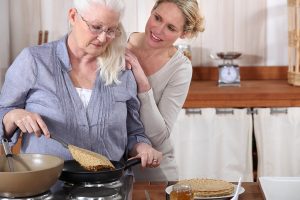Recent news and updates
Guest Blog: How Do Seniors With Alzheimer’s Handle Change?
When seniors develop diseases affecting cognition, like the various kinds of dementia, caregivers typically make an effort to make their living environment as safe and comfortable as possible. Sometimes caregivers make lots of changes to a senior’s living space, with the best intentions of helping them. However, this can have a two-sided effect, because seniors with mentally deteriorating illnesses can find change to be a confusing or frightening thing. Caregivers might change the entire layout of a house, remove everything that could be a hazard, or add numerous locks to provide security. Changes like these can actually prove to be disorienting for a senior, in addition to being helpful. So the question becomes, how much change can seniors with Alzheimer’s handle?
It’s typical to find instances where seniors have lived in the same home for decades, and have a curious ability to navigate the living space with a sort of muscle memory after memory-harming diseases like Alzheimer’s set in. Routine is very important to the delicate psyche of an elder with dementia, so finding the perfect balance of what to change for their own good can be tricky. Making abrupt overwhelming makeovers to their home’s layout can make them flustered and end up actually making it more difficult for them to get around, adding to their impaired cognition. So it is best to maintain an environment that is familiar as much as possible. And make any alterations subtly and slowly over time.
The necessity to make changes will depend of the severity of a senior’s individual case. If the Alzheimer’s is in the mid to late stages and a senior is wandering out of the home constantly, then immediate action to prevent hazard is surely appropriate. Installing door alarms or adding locks can be great helps. If a senior with dementia typically kept a messy household, then the mess may add to their unease or make it easier to trip and fall. De-cluttering their living space can be advantageous in these cases.
Thus, change will surely be necessary at times. Though it is advisable to make changes as gradually and calmly as possible, to avoid overwhelming or distressing what was comfortable, normal, and assuring to the mind of a loved one with dementia. Routine is key for security in these instances. It may also be helpful to make sure you let them see when you move something, or set their things some place, to help then more easily adapt to the change.






